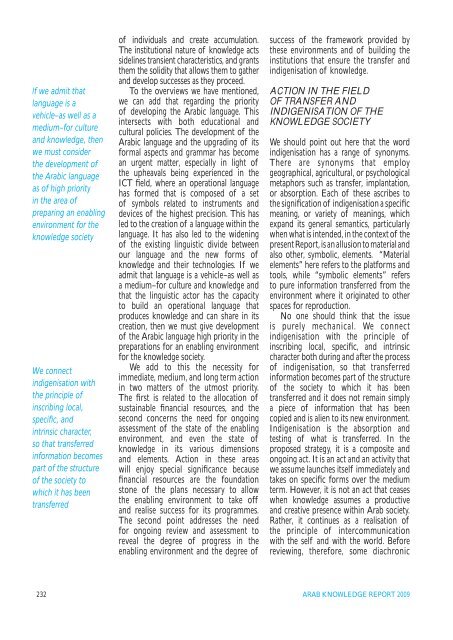Arab Knowledge Report 2009: Towards Productive
Arab Knowledge Report 2009: Towards Productive
Arab Knowledge Report 2009: Towards Productive
- No tags were found...
Create successful ePaper yourself
Turn your PDF publications into a flip-book with our unique Google optimized e-Paper software.
If we admit thatlanguage is avehicle–as well as amedium–for cultureand knowledge, thenwe must considerthe development ofthe <strong>Arab</strong>ic languageas of high priorityin the area ofpreparing an enablingenvironment for theknowledge societyWe connectindigenisation withthe principle ofinscribing local,specific, andintrinsic character,so that transferredinformation becomespart of the structureof the society towhich it has beentransferredof individuals and create accumulation.The institutional nature of knowledge actssidelines transient characteristics, and grantsthem the solidity that allows them to gatherand develop successes as they proceed.To the overviews we have mentioned,we can add that regarding the priorityof developing the <strong>Arab</strong>ic language. Thisintersects with both educational andcultural policies. The development of the<strong>Arab</strong>ic language and the upgrading of itsformal aspects and grammar has becomean urgent matter, especially in light ofthe upheavals being experienced in theICT field, where an operational languagehas formed that is composed of a setof symbols related to instruments anddevices of the highest precision. This hasled to the creation of a language within thelanguage. It has also led to the wideningof the existing linguistic divide betweenour language and the new forms ofknowledge and their technologies. If weadmit that language is a vehicle–as well asa medium–for culture and knowledge andthat the linguistic actor has the capacityto build an operational language thatproduces knowledge and can share in itscreation, then we must give developmentof the <strong>Arab</strong>ic language high priority in thepreparations for an enabling environmentfor the knowledge society.We add to this the necessity forimmediate, medium, and long term actionin two matters of the utmost priority.The first is related to the allocation ofsustainable financial resources, and thesecond concerns the need for ongoingassessment of the state of the enablingenvironment, and even the state ofknowledge in its various dimensionsand elements. Action in these areaswill enjoy special significance becausefinancial resources are the foundationstone of the plans necessary to allowthe enabling environment to take offand realise success for its programmes.The second point addresses the needfor ongoing review and assessment toreveal the degree of progress in theenabling environment and the degree ofsuccess of the framework provided bythese environments and of building theinstitutions that ensure the transfer andindigenisation of knowledge.ACTION IN THE FIELDOF TRANSFER ANDINDIGENISATION OF THEKNOWLEDGE SOCIETYWe should point out here that the wordindigenisation has a range of synonyms.There are synonyms that employgeographical, agricultural, or psychologicalmetaphors such as transfer, implantation,or absorption. Each of these ascribes tothe signification of indigenisation a specificmeaning, or variety of meanings, whichexpand its general semantics, particularlywhen what is intended, in the context of thepresent <strong>Report</strong>, is an allusion to material andalso other, symbolic, elements. “Materialelements” here refers to the platforms andtools, while “symbolic elements” refersto pure information transferred from theenvironment where it originated to otherspaces for reproduction.No one should think that the issueis purely mechanical. We connectindigenisation with the principle ofinscribing local, specific, and intrinsiccharacter both during and after the processof indigenisation, so that transferredinformation becomes part of the structureof the society to which it has beentransferred and it does not remain simplya piece of information that has beencopied and is alien to its new environment.Indigenisation is the absorption andtesting of what is transferred. In theproposed strategy, it is a composite andongoing act. It is an act and an activity thatwe assume launches itself immediately andtakes on specific forms over the mediumterm. However, it is not an act that ceaseswhen knowledge assumes a productiveand creative presence within <strong>Arab</strong> society.Rather, it continues as a realisation ofthe principle of intercommunicationwith the self and with the world. Beforereviewing, therefore, some diachronic232 ARAB KNOWLEDGE REPORT <strong>2009</strong>
















